- Home
- Priscilla Royal
Sanctity of Hate mm-9 Page 9
Sanctity of Hate mm-9 Read online
Page 9
“You were right to send him home, Crowner. I am happy to take his place.”
“I heard the tale of the argument between Kenelm and ben Asser from Signy. Had you heard of it?”
“Oseberne and his son told me as well.” Although he was happy to share what he had learned about this with his friend, he chose to remain silent about the accusations against Gytha.
Ralf turned to face the stable entrance. “Jacob ben Asser!” he shouted. “In the name of King Edward, I order you to come forth.”
The face of the man who emerged was as pale as a corpse, and profound fatigue had bruised the skin with black circles under his eyes. Even his back was bent like that of an old man, but his gaze at the crowner was sharp with defiance.
This man had expected to be ripped apart by the howling mob, yet he refuses to cower and still honors the king’s command. Suddenly Thomas understood that, if ben Asser had killed Kenelm, he could not demand sanctuary in the priory church, clutching the altar as a Christian might. He had no such option to avoid the hangman’s rope by foreswearing the realm and sailing to France. This saddened the monk, and he found himself respecting the man’s courage even more.
Jacob glanced at the monk. His jaw clenched.
Thomas stretched out his hand, then dropped it. This was one who had no desire for his blessing, let alone any comforting words he might speak. He was a monk, and his very presence was menacing to one of ben Asser’s faith. Although Thomas meant no ill, he now saw that he had been wrong to come with Ralf for this questioning. His presence had been misinterpreted as a threat. In an attempt to convey a peaceful intent, the monk bowed his head.
Jacob studied at the monk, then nodded almost imperceptibly in response. Looking back at the crowner, he replied, “I obey, my lord.”
“You have much to answer for,” Ralf said.
Jacob spread his arms. “Ask what you must. I am ready.”
“Witnesses have claimed you threatened to kill Kenelm not long before he was found dead.”
Jacob’s lips twisted into a bitter smile. “He and I argued. Each of us exchanged hot words. Had my corpse been found, would these villagers be so eager to riot and announce that he had threatened me in like fashion? Whether my words made him angry enough to kill is something he can no longer answer. As for me, his words did not drive me to murder.”
“You exchanged blows.”
“We shoved each other. Nothing more.”
“What caused this quarrel?”
“He did mock my faith.” Jacob’s look betrayed resignation. “That, by itself, is little enough if the violence suffered is only with stinging words, my lord. We have learned to turn away when those, like Kenelm, ridicule what is holy to us.”
“But you did not retreat this time.”
Jacob gestured with a sigh toward the stables behind him. “As I said to you before, my wife is close to her term and suffers grievously. She needs rest to keep her strength for the coming ordeal. Kenelm, like that other youth whom you sent away, would not allow her to sleep. With courtesy, I asked him to lower his voice. He…” The man’s face turned red with controlled fury. “I need not repeat what he said, but he insulted my wife’s virtue and raised his voice so she could not help but hear his vile words.”
Ralf nodded, gesturing for the man to continue.
“It was then that I shoved him. Perhaps we did exchange some blows.” He raised his arms, then let them fall to his sides.
“You did not threaten to kill him?”
“I cannot swear to any verbal restraint in that moment. I might have said such a thing, as he might have responded in like fashion to me as well. But words are but sounds, often meaning nothing, as wise men have said. Yet he is dead, and I stand before you, still breathing. Some will surely say that proves my guilt. I can only deny it, and I give you my oath that it is true.”
“Have you any proof of innocence besides your oath?”
“Will you take a woman’s word?”
Ralf said nothing.
“I thought not, but my wife and her mother can confirm that I did not leave them that night.”
“No one else.”
“No Christian man, my lord.”
Thomas looked at Ralf and saw a glimpse of sympathy in his friend’s eyes.
“Yet no one can say that I left the hut, either. May two negatives prove the positive that is innocence?”
Had the matter been less grave, the crowner might have laughed at the man’s jest. Thomas allowed himself to smile.
“Jacob!”
The man spun around.
A white-haired woman emerged from the stable, gesturing with cruelly crippled hands. “Belia’s water has broken. She will soon give birth. We must have a doctor…”
“There is none!” Jacob finally lost control, and tears poured down his cheeks.
For just a moment, Ralf forgot that this man was a murder suspect and grabbed Jacob’s shoulder. “I shall send for Sister Anne from the priory hospital.”
“You must not!” Jacob’s voice was raw with pain. “Our child will be baptized and taken from us.” He fell to his knees and began to pray in a language Thomas recognized as Hebrew.
“You would let your wife and babe die…”
Suddenly Thomas put a restraining hand on the crowner’s shoulder. “Wait!” he said and drew closer to Jacob and the white-haired woman. “Did your family not come originally from Norwich?”
Belia’s mother nodded.
“Sister Anne’s father was a respected physician there. His name was Benedict.”
Malka gasped, covering her mouth in shock. “Benedict of Norwich? My husband and I knew him well. We…” She stared at the monk. “His daughter is a nun at this priory?”
“She is also an apothecary and trained in medical wisdom by her father before he died.”
Malka’s eyes grew large as she placed the heel of her palms against her cheeks. Then she knelt beside Jacob. “We must let her come. I knew her father. He was a good man, and I remember this daughter when she was a child.”
“She is a nun,” Jacob replied in horror. He gestured at Thomas. “They, she, he will…”
“…do nothing except allow Benedict’s daughter to save Belia’s life and that of my grandchild. I shall remain by my daughter’s side.” She looked up at the monk. “Do you swear it? Give me your word that you will not strip my Belia and her child of their faith and heritage.”
“I swear that we shall not baptize the child or the mother, even in the face of death and at the cost of their immortal souls,” Thomas replied. It had not been his intent to say that, and his voice shook. Oddly, his heart remained at peace. He looked up at the heavens. A soft breeze from the sea touched his face. Apparently, God was not about to strike him dead over such a promise.
“Then bring Sister Anne to my child,” the mother cried. “I beg you for that mercy!”
Thomas turned and ran back to the priory much faster than he thought possible.
15
Eleanor looked down from her window and watched Brother Beorn, Gytha, and Sister Anne hurry along the mill pond path toward the village. The lay brother’s galloping pace was well-matched by Sister Anne’s long legs, but the maid struggled to keep up.
Had their mission been less dire, the prioress might have smiled with fond amusement. Instead, her heart ached, as it always did when women faced perilous births. Although she knew the danger and pain were Eve’s legacy for rebelling against God’s will, she never forgot, nor quite forgave, the death of her own mother in childbed.
She turned around. “How old is the wife?”
Brother Thomas stood near her carved audience chair and held a large orange cat in his arms. As the monk absently stroked Arthur’s head, this patriarch of priory felines and hero in the wars against kitchen rodents closed his eyes and purred like a kitten.
“I believe that she and Gytha may share a similar length of time on this earth,” he replied after a moment and, again falling int
o silence, went back to petting the cat.
This time Eleanor did smile, a delight shared by the young nun in attendance who stood near the chamber door. Many feared cats, believing them to be Satan’s followers. Others concluded they were merely useful in keeping mice and rats away from edible stores. Yet this monk found as much pleasure in Eleanor’s favored beast as she did herself. And, perhaps, the cat also brought him peace and comfort after the ordeal he had faced, braving the rioting villagers. She shuddered at the risk he had taken but was proud of his courage. This time, her smile reflected her admiration for the man she both sinfully and virtuously loved.
The monk looked up, his expression contrite. “Forgive me, my lady, I did not mean to offend. My thoughts had taken a strange turn, and I was calling them back.”
Knowing he had caught her smile, she said: “I meant neither mockery nor censure, Brother. Indeed, I was thinking that your well regarded gentleness was matched by your courage in preaching compassion to the villagers.”
He blushed with modesty, then shook his head as if dismissing any virtue in what he had done. “Your decision to send Brother Beorn to guard Jacob ben Asser’s family, while his wife gives birth, was both wise and an act of great charity, my lady.”
“I did not want those men whom you faced in the road to harbor the smallest doubt that this priory follows the direction of Pope Gregory. As for the choice of Brother Beorn, that was a logical one. He is a man of the village and one known rarely to suffer fools. If he stands before the entrance to the stable, scowling as is his wont, those who are tempted to breach the fragile walls may be reminded of the cherubim with their flaming swords at the gates of Eden.”
Thomas chuckled but again fell silent as he continued to stroke the cat.
“Something troubles you greatly, Brother.”
Realizing that the monk’s attention was drifting from him, Arthur leapt out of Thomas’ arms and onto the floor.
The cat’s bearing as he trotted through the chamber door reminded the prioress of a manor reeve going to inspect lands for which he was responsible.
“I may have condemned a babe’s soul, my lady.”
Peace fled, and she felt a chill. “How so?”
“I promised Jacob ben Asser and his mother-in-law that we would not baptize the newborn child even if it were in danger of dying. The same promise was given for the babe’s mother, but she is of an age to know the consequences of her deeds.”
The prioress said nothing and walked back to the window.
He waited. A light breeze flowed through the chambers, the salt smell hinting that more rain would fall within a few hours. From the orchard of priory fruit trees, birds chirped loudly to herald the coming showers. He wondered how Brother Gwydo’s bees were doing under his tender care and felt an odd ache in his heart when the lay brother came to mind.
At last, the prioress turned around to face the monk, her brow furrowed.
“I shall be as forthright with you as you have been with me, Brother. I suffer doubts about the efficacy of forced baptism. As a priest, you understand better than I about these matters, but surely God knows when a conversion is not truly desired.”
“I agree, my lady, but we speak primarily of a child whose reason is unformed and who is therefore dependent upon the judgment of his parents. Jacob ben Asser and his family have rejected our offer of Christian salvation. That is a dangerous decision.”
“We might conclude that it is better to override their will and cloak their babe’s soul in a faith the parents do not own. But if the baptized child lives, both they and we know it must be taken from them. A Christian may not be raised by a Jewish family. Shall we not trust that God will have mercy on the babe and thus let the mother know she may keep her child? The anticipation of holding an infant to her breast gives a mother comfort and strength in the throes of a dangerous birthing.”
“Many men would say that salvation is of the greatest importance, that the family’s faith is a delusion nurtured by the Devil, and that any comfort the mother felt was born in evil.” Thomas looked away. “Yet learned voices joined with mine when I made that promise regarding the child. For one, the good Thomas Aquinas, so recently taken into God’s hands, spoke of a dead infant’s state of eternal joy which would be untempered by knowledge of what he had lost without baptism. And St. Paul’s wisdom also echoed in my soul. Is not charity the highest virtue, even above faith?”
Eleanor nodded. “I am grateful for your teaching, Brother. It may be wiser to change men’s hearts by practicing love and compassion, the tenets of our faith. Should mother and babe live, due to Sister Anne’s skill and the grace of God, this family may yet see the error of their beliefs and come willingly to ours.”
“I shall hope for that, my lady.”
“Yet I do not believe even this question of a child’s soul, no matter how important, is the sole cause of that shadow veiling your eyes.”
Thomas looked down at the floor. “Rumor’s face is scarred with the pox of lies and envy, her speech filled with curses, but men love her nonetheless. I fear she has recently uttered a particularly vile blasphemy.”
She visibly trembled. “We have always been of one mind on the need for plain speech. What have you heard, from whom, and what is your opinion of the tale?”
“While I was questioning Adelard on his reasons for wishing to take vows, he said that the world was too wicked for him. I pressed him for examples. He claimed that Evil is so rampant that those who dress in virtue during the daylight strip themselves of it to revel in sin at night.”
“He named someone from the priory?”
Thomas nodded.
“It is my duty to determine verity or falsehood in such accusations.”
“He claimed to have witnessed Brother Gwydo and Gytha having carnal knowledge of each other near the hut of Ivetta the Whore on the night Kenelm was killed.”
Eleanor’s head turned sharply as if she had been slapped.
“My lady, I do not know Brother Gwydo well, but I cannot believe that your good maid would commit such a sin.” He reached out as if pleading for forgiveness. “Had the villagers not attacked Cuthbert and the family he was protecting, I would have questioned Adelard further. Under the circumstances, I could not…”
“You had no choice,” Eleanor said, her voice rough with emotion. “Nor do I believe the two committed such a deed.”
“With your leave, I shall question the baker’s son further.”
She shook her head. “Not unless it is necessary. He believes he told you the truth, or else the Devil has enchanted him with this imagining. We can only hope that he has not whispered to others besides you about the sin he claims to have witnessed.”
“I do not trust him to have held his tongue. Adelard may have spread the news in the village that Kenelm and Jacob ben Asser fought the night before the guard was murdered. He, or another, suggested the Jewish family committed the crime to sully priory ground and foul our water. That was the reason the crowd attacked Cuthbert as he stood guard at the inn’s new stables, and threatened him so they could attack the Jewish family.”
“Do you know that Adelard is to blame?”
“I do not. When our crowner questioned some of the men after they had calmed, no one could remember where they had heard the tale. Yet how many others could have heard the arguments?”
“Mistress Signy.” She raised a hand. “I do not think that she was the source of this infamy, but, if she overheard the quarrel, others might just as well.”
“But surely no one else witnessed Brother Gwydo…”
“Let us hope Adelard said nothing. If not, the reputations of both my maid and our lay brother have been rudely compromised. I must find out the truth, and we shall make sure that the innocent are cleansed of any filth thrown upon them by these lies.”
“Should I summon your maid from the village?”
“Gytha is assisting Sister Anne with the birth, but, when she returns, I shall question her. As for B
rother Gwydo, I would hear my maid’s tale before I question him. Gytha’s answers may explain all, and I may not need to involve our lay brother in this vile accusation.”
With those words, Eleanor gently dismissed the monk, sending him to the inn until it was time to escort Sister Anne back to the priory, but she was deeply troubled.
Was Adelard right? Was this the cause of Gytha’s sad demeanor of late? But why had the young woman not confided in her? “She must know that I would neither condemn nor cast her forth,” she murmured. “After all these years, she has surely learned to trust me. Something has indeed happened, but I cannot believe the truth matches the tale Adelard has told.”
Nonetheless, Eleanor retreated to her prie-dieu and, for a very long time, knelt in anxious prayer.
16
Belia’s eyes were white with terror. Bloodstains streaked her chemise.
“Be brave, my sweet child and my heart’s delight. This present agony is the worst,” Malka crooned. “It shall not last much longer.” Wiping her daughter’s face with a damp cloth, she encouraged Belia to continue walking in a tight circle within the stall.
Signy pushed aside the heavy sacking over the entrance and slipped into the small space. “Do you want more water in which to bathe her?”
“The one soaking was sufficient. The boiled fenugreek, mallow, and barley need only be used at the beginning of the birth.” Anne gestured at the sacking. “But please take down that cloth. The men will keep their distance while she is giving birth, and we can hardly breathe.” She was sweating, and her robe was splotched with pale blood.
The innkeeper pulled it down and set it folded on the straw. “Jew or Christian, we are all daughters of Eve,” she said, gesturing at mother and daughter. “Tell me what I can do to help this suffering cousin.”
With anyone else, Anne might have been surprised at such words, but these came from a woman known for compassion. “I shall need more hot water in which to soak the fennel for the poultice against her back. But first I ask that you support Mistress Belia while she walks. I must speak with her mother.”

 The Twice-Hanged Man
The Twice-Hanged Man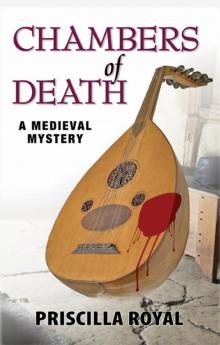 Chambers of Death mm-6
Chambers of Death mm-6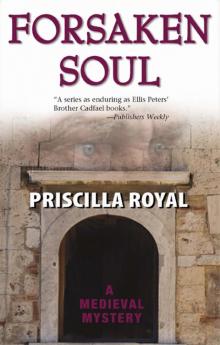 Forsaken Soul
Forsaken Soul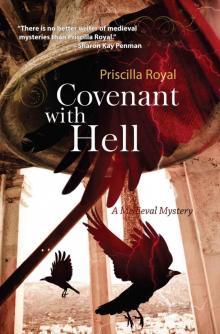 Covenant With Hell (Medieval Mysteries)
Covenant With Hell (Medieval Mysteries)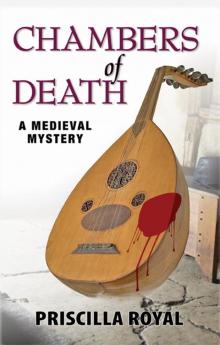 Chambers of Death
Chambers of Death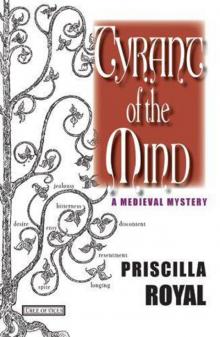 Tyrant of the Mind
Tyrant of the Mind Wild Justice
Wild Justice Sorrow Without End
Sorrow Without End Wine of Violence
Wine of Violence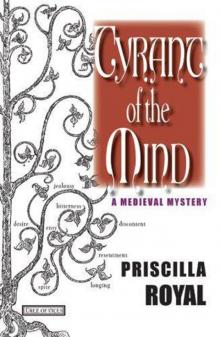 Tyrant of the Mind mm-2
Tyrant of the Mind mm-2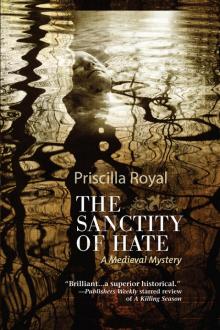 The Sanctity of Hate
The Sanctity of Hate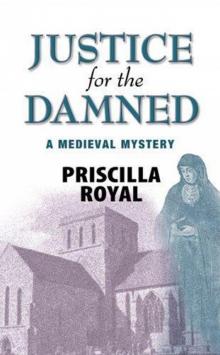 Justice for the Damned
Justice for the Damned The Proud Sinner
The Proud Sinner A Killing Season mm-8
A Killing Season mm-8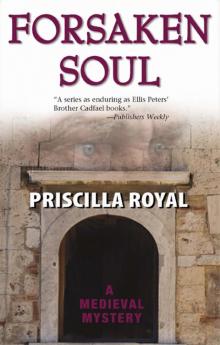 Forsaken Soul mm-5
Forsaken Soul mm-5 Valley of Dry Bones mm-7
Valley of Dry Bones mm-7 Valley of Dry Bones
Valley of Dry Bones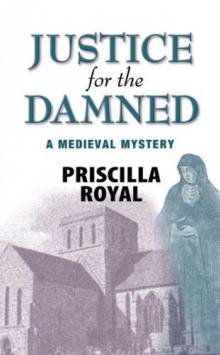 Justice for the Damned mm-4
Justice for the Damned mm-4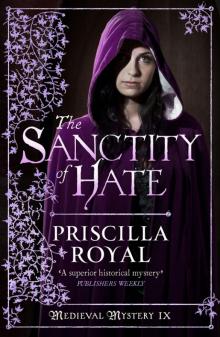 Sanctity of Hate
Sanctity of Hate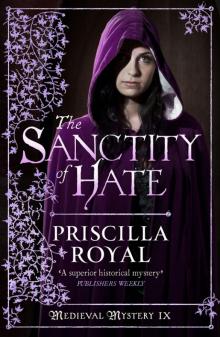 Sanctity of Hate mm-9
Sanctity of Hate mm-9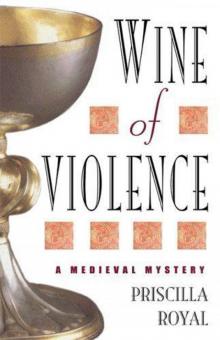 Wine of Violence mm-1
Wine of Violence mm-1